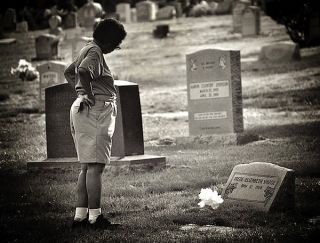Relationships
When Grandma Grieves 50 Years of Love
How do we know if our loved ones are grieving normally?
Posted October 19, 2012
A student from class, Mary, came into my office and sat in an orange over-stuffed chair. We talked about a paper assignment. Then, hesitantly, she asked a question that probably brought her there in the first place.
She tells about her grandparents. They had been married over 50 years, and just recently her grandfather died. Her grandmother is grieving deeply. Then Mary said, “Every day my grandma adds dirt to my grandpa’s grave. I’m worried about her. Doesn’t that sound like a problem? Is there something wrong with her?”

I leaned forward and saw in Mary’s glistening eyes how much she loved her grandma and how confused she was by this behavior.
I said, “Mary, your grandparents were married over 50 years. That is more than twice your lifetime. They took care of each other and were together every day. I imagine your grandma cannot suddenly just stop taking care of him. Her adding dirt to his grave is a way to take care of him now.”
Mary sighed and said, “I had not thought of it that way.”
When she was able to see her grandmother’s behavior as an expression of love, Mary no longer worried that something was wrong with her. Yes, she still has concerns because her grandma hurts. But she no longer carries the burden of questioning the “normality” of her grandma’s behavior.
We live in a culture that tells us grief is an illness: something to fear, avoid, prevent, drug, silence, or end. Obviously, grief is not fun, but it is normal and part of loving someone.
Often people do not talk about grief, so when we see in depth what it is like for someone, we may be surprised.
People respond to loss in different ways. Our grieving is individual. We may have similarities with others, which can be helpful, but every one finds his or her way in responding to a loss. I don’t mean that you have to be on your own in the process, though decidedly it can be a lonely journey. Our grieving does not need to conform to someone else’s expectations.
Giving her grandma room to grieve brought Mary freedom. Rather than trying to judge her against cultural standards, Mary is free to be present with her grandma. And along the way, Mary will learn about grief and a 50-year love story that continues.
Nancy Berns is author of Closure: The Rush to End Grief and What It Costs Us.


